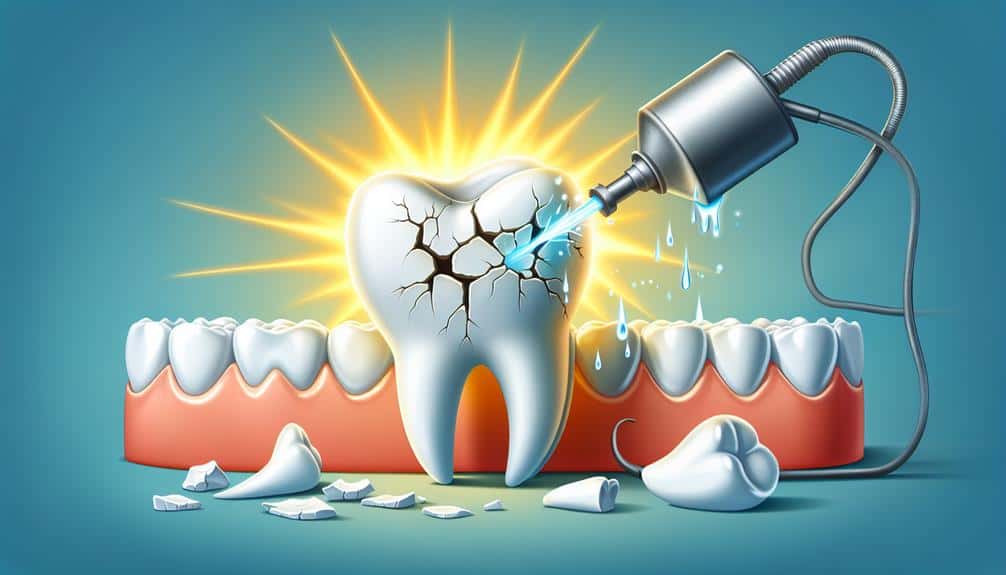Whitening damaged teeth can worsen existing problems like sensitivity, uneven whitening, nerve irritation, and potential further damage to tooth structure. Using whitening products on compromised teeth can increase sensitivity, lead to inconsistent whitening results, and even irritate the nerves in your teeth. These risks highlight the importance of consulting with a dental professional before proceeding with whitening treatments to safeguard your dental health. To understand these risks better and explore preventive options, it's essential to seek expert guidance tailored to your specific situation.
Key Points
- Whitening can worsen enamel damage, leading to increased sensitivity.
- Uneven whitening results may occur, causing dissatisfaction and color consistency issues.
- Irritation of nerves is possible, resulting in temporary sensitivity and discomfort.
- Risk of further damage includes weakened enamel, heightened sensitivity, and potential long-term structural damage.
- Consult a dental professional before whitening to safeguard tooth structure and explore alternative treatments.
Enamel Damage
Whitening damaged teeth can worsen enamel damage, leading to increased sensitivity and potential long-term repercussions. The enamel, the outermost layer of the tooth structure, can become compromised due to various factors such as acidic foods, poor oral hygiene, or teeth grinding. When enamel is already damaged, the use of whitening agents can further weaken its structure, making it more susceptible to sensitivity and decay.
It is important to contemplate repair options for damaged enamel before opting for teeth whitening procedures. Repairing enamel damage can involve treatments like bonding, veneers, or crowns, depending on the extent of the damage. These options not only restore the tooth's structure but also provide added protection against further deterioration.
Before undergoing any whitening treatment, consult with a dental professional to assess the condition of your enamel and explore the best repair options available. Safeguarding the tooth structure is essential for maintaining ideal oral health and preventing potential complications in the future.
Increased Sensitivity
To minimize the risk of heightened tooth sensitivity, it's important to take into account the potential impact of whitening procedures on already damaged enamel. When whitening damaged teeth, you may experience increased sensitivity due to the exposure of dentin or nerve endings. Sensitivity management is vital in such cases. Before undergoing any whitening treatment, consult with your dentist to discuss your options and make sure that your enamel damage is evaluated. Your dentist may recommend desensitizing toothpaste or fluoride treatments to help manage sensitivity during and after the whitening process.
In addition to sensitivity management, exploring treatment alternatives is essential. Instead of traditional whitening methods, your dentist may suggest alternatives such as veneers or bonding to improve the appearance of your teeth without exacerbating sensitivity. These options can help minimize the risk of further damage to already compromised enamel while still achieving a brighter smile. Prioritize your oral health by seeking professional guidance on the most suitable whitening approach for your specific condition.
Uneven Whitening Results
When seeking teeth whitening treatments, it's crucial to be mindful that uneven results can occur, impacting the overall aesthetic outcome of your smile. Uneven whitening results may lead to dissatisfaction with the treatment and affect your confidence in your smile.
Here are some key points to keep in mind:
- Color consistency issues: Uneven whitening can lead to some teeth being whiter than others, creating a mismatched appearance.
- Staining concerns: Areas that are more resistant to whitening agents may retain stains, resulting in a patchy or splotchy look.
- Treatment effectiveness: Uneven results may suggest that the whitening treatment wasn't evenly applied or didn't penetrate the teeth uniformly.
- Maintenance challenges: Keeping up with inconsistent whitening results may require more frequent touch-ups or adjustments.
- Consultation importance: Discussing your expectations and concerns with a dental professional can help prevent uneven whitening and ensure a more satisfactory outcome.
Being mindful of these factors can help you make informed decisions about whitening treatments to achieve a more harmonious and natural-looking smile.
Irritation of Nerves
Irritation of nerves during teeth whitening treatments can result in discomfort and sensitivity in the teeth. The bleaching agents used in whitening procedures can sometimes penetrate the enamel and reach the dentin, where the nerves are located. This penetration can lead to temporary nerve sensitivity, causing sharp pain or increased sensitivity to hot or cold temperatures. Individuals with pre-existing dental nerve issues may be more susceptible to experiencing heightened sensitivity during or after whitening treatments.
If you're experiencing nerve sensitivity after a whitening treatment, there are several treatment options available. Using desensitizing toothpaste containing ingredients like potassium nitrate or fluoride can help alleviate discomfort. Avoiding hot or cold foods and drinks can also prevent further irritation to the nerves. In severe cases, your dentist may recommend in-office treatments such as fluoride varnishes or gels to reduce sensitivity. It's essential to consult your dentist if you experience prolonged or severe nerve sensitivity after a whitening procedure to determine the best course of action for your dental health.
Risk of Further Damage
Damage to already compromised teeth is a significant risk associated with teeth whitening procedures. When contemplating whitening damaged teeth, it's vital to be aware of the potential complications and long-term effects that may arise. Here are some key points to keep in mind:
- Weakened Enamel: Whitening products can further weaken enamel that's already compromised, leading to increased sensitivity and vulnerability to decay.
- Increased Sensitivity: Teeth that are already damaged may become even more sensitive to hot or cold temperatures post-whitening.
- Risk of Cracks: Existing cracks or chips in the teeth may worsen with the use of whitening agents, potentially leading to more extensive damage.
- Irritation of Nerves: The chemicals in whitening products can irritate the nerves of already damaged teeth, causing discomfort and pain.
- Long-Term Structural Damage: Overuse of whitening treatments on damaged teeth can result in long-term structural damage, impacting the overall health of the teeth.
Considering these factors, consulting with a dentist before undergoing any whitening procedures on compromised teeth is essential to minimize the risk of further damage.
Frequently Asked Questions
Can Whitening Damaged Teeth Cause Any Long-Term Effects on Overall Oral Health?
When whitening damaged teeth, you may experience heightened teeth sensitivity and enamel erosion. These effects could have significant consequences on your oral health. It is important to consult a dental professional for guidance.
Is It Possible to Reverse the Damage Caused by Whitening Treatments on Already Damaged Teeth?
To reverse damage from whitening on already weakened teeth, consult your dentist. They can evaluate the extent of enamel erosion and recommend restoration options. Addressing tooth sensitivity and protecting enamel is essential for maintaining oral health post-whitening.
Are There Any Natural Remedies or Alternative Treatments for Whitening Damaged Teeth?
Looking for natural remedies or alternative methods to whiten damaged teeth? DIY treatments like baking soda or activated charcoal paste, and home remedies such as oil pulling with coconut oil, may offer gentler options worth exploring.
How Often Can I Safely Whiten My Teeth if They Are Already Damaged?
To safely whiten damaged teeth, limit frequency to once every 6-12 months. Follow safety precautions like using a dentist-approved whitening method. Consider alternative methods or natural remedies under dental supervision for gentle whitening that protects your dental health.
Are There Any Specific Toothpastes or Oral Care Products That Can Help Prevent Further Damage While Whitening Damaged Teeth?
To manage sensitivity and protect enamel while whitening damaged teeth, consider toothpaste with potassium nitrate or fluoride. Look for products that integrate whitening maintenance with oral health benefits to prevent further damage.



